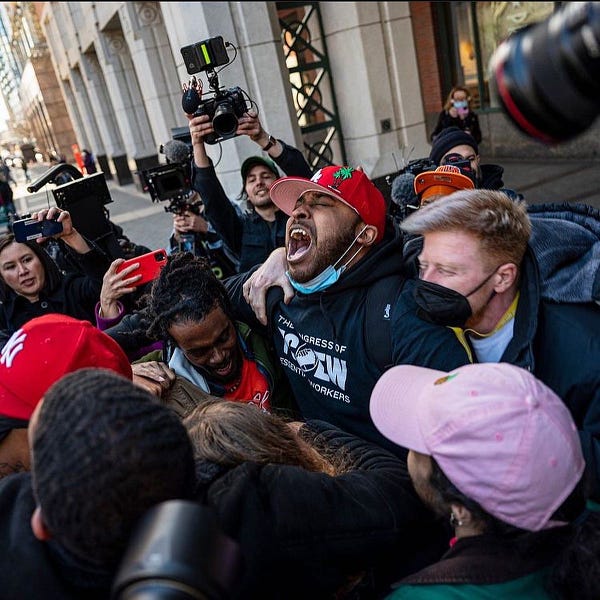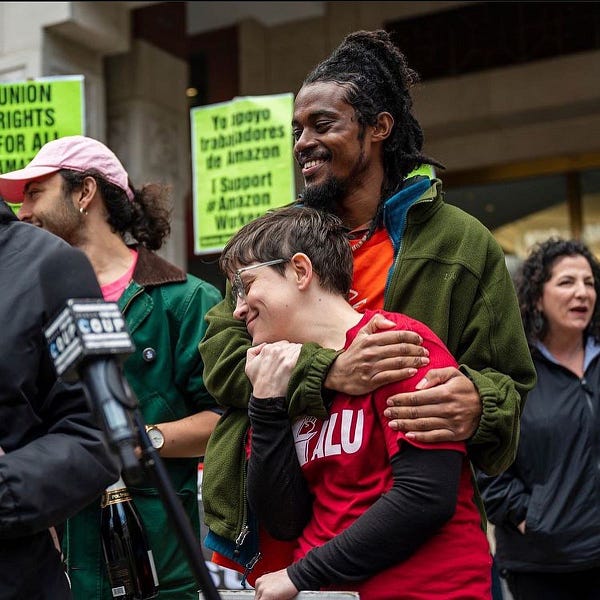Happy Monday, and welcome to the thirteenth edition of Waco Can’t Wait, a progressive newsletter focusing on McLennan County, Texas, and Federal politics. My law school quarter is coming to a close and finals are around the corner. While this month will be busy for me between school, campaigns and the Easter holiday, I will do my best to keep posting on a regular basis.
One of the reasons I started Waco Can’t Wait is because progressive change is not inevitable. All of the great leaders and social movements in history had to work incredibly hard to manually bend the arc of history towards a more just world.
That said, many find it difficult to imagine how large changes may be made in a political system that is defined by its refusal to budge. How much power do we really have when the final call is made by the septuagenarians in Congress.
It turns out, Wacoans actually have quite a bit of power to shape our destiny. Not only are there tons of policies that can be passed at the municipal level through our council members, citizens also have the ballot initiative as a tool. By collecting a specified amount of signatures, we can put questions of policy directly to the voters.
I believe we should use this process to decriminalize marijuana in Waco, and I believe we can be successful. But before we dive into such an ambitious endeavor, let’s take a look at the news!
Week in review (a collection of news from Waco, Texas, and beyond)
Waco:
Jeffrey Vitarius, the communications chair for Waco Pride Network, made four requests of the council members:
A proclamation recognizing Pride Month;
A nondiscrimination ordinance;
Consideration of the local LGBTQ community in economic development strategy; and
Using their platforms to elevate the voices of LGBTQ residents.
Texas:
The State of Texas is attempting to use current redistricting litigation to further weaken the Voting Rights Act (VRA) protections. Section 2 of the VRA prohibits discriminatory voting procedures and practices that deny voters of color an equal opportunity to participate in elections. In Texas’ legal briefs provided to the three-judge panel in El Paso, the state has argued that voters and advocacy groups do not have standing to bring lawsuits under Section 2. The state is also arguing that Section 2 simply does not apply to redistricting at all.
This attack on the Voting Rights Act is not localized to Texas. Florida Governor Ron DeSantis has been urging the state legislature to create new redistricting maps that would eliminate a plurality-Black congressional district in Northern Florida. DeSantis’ general counsel also argued in a memo that preserving this district would actually be unconstitutional.
The Texas Hispanic Policy Foundation released a comprehensive 2022 poll that sheds some light on the upcoming primary runoff races and the general election. Here are some of the toppling numbers:
Greg Abbott leads Beto O’Rourke 50% - 42%;
Mike Collier leads Michelle Beckley 43% - 31%;
In a general election hypothetical, Dan Patrick leads Collier 49% - 43%;
Ken Paxton leads George P. Bush 65% - 23% (yikes);
Of the Republicans who said they would never vote for George P. Bush, 66% of them said it was because he is a member of the Bush family.
Rochelle Garza leads Joe Jaworski 46% - 31%;
Republicans lead Democrats in the November generic U.S. House ballot 49% - 42%.
Governor Greg Abbott announced that he will start transporting migrants at the U.S. - Mexico border to Washington D.C. No, seriously.
Finally, check out this really cool story from the Texas Monthly about Tayhlor Coleman, a seventh-generation Texan traveling the state registering voters out of her van.


United States:
Judge Ketanji Brown Jackson has been confirmed by the U.S. Senate and will be the first Black woman to ever serve on the U.S. Supreme Court. I have spoken about Jackson’s nomination at length, but I am so excited to see her finally confirmed with a bipartisan majority. Her unique experiences and strong legal background will be a great asset to our nation, and I look forward to reading her first legal opinion.


Amazon workers on Staten Island have voted to unionize, creating the first unionized Amazon warehouse in history. The final vote was 2,654 votes for and 2,131 against, and the union will now represent more than 8,300 workers.
This is a huge deal. While union membership is currently at a decades low of 10.3%, this year has been marked by a significant increase in unionization drives across the country. What is really interesting about the Amazon Labor Union is that it is not affiliated with any of the larger union organizations. It was founded by Christian Smalls, a former Amazon employee that was fired by Amazon back in 2020 for protesting COVID safety protocols.
These organizers faced steep odds in their campaign to create the first Amazon union. Amazon spent $4.3 million on union-busting consultants in 2021, and it even hired a Democratic polling firm to create anti-union materials that would discourage unionization.
Amazon also subjected their employees to captive audience meetings where management would compel their employees to listen to anti-union, corporate propaganda that is geared towards intimidating workers and dissuading them from supporting the union.
Despite all of these challenges, these workers have chosen collective action. Being a part of this union will allow them to bargain for higher wages, better working conditions, and more of a say in how the warehouse is run.
To learn more about how these workers organized inside and outside of their workplace to make this happen, check out this interview with warehouse worker and organizer Angelika Maldonado. If you or anyone you love wants to learn more about the benefits of unionization and how to start one, I recommend reaching out to Emergency Workplace Organizing or Labor Notes to get in touch with someone who can help you organize your workplace.
With the passage of the American Rescue Plan and signing of executive orders, Biden has been able to strengthen the landmark healthcare law that expanded coverage to millions of Americans. There has also been some movement on Medicaid expansion in mostly red states, the most recent additions being Missouri and Oklahoma.
Political Organizing/Communication:
A good tweet does not win an election, but it sure doesn’t hurt! Mike Collier has always been a naturally strong communicator, and his social media team has done a really good job of capturing his style on social media. I’ve always been of the opinion that politicians should be running for something, rather than just against everything.

One of the Democrats’ biggest challenges in 2022 could be youth voter turnout. Millennial and Generation Z voters are the most progressive and diverse voting blocks in the country, and their support for Biden was a big part of his victory in 2020. In the states of Arizona, Georgia, Michigan and Nevada, there were double digit increases in turnout among voters younger than 30 years old. That said, this turnout usually has a steep drop off in the midterms, and Biden’s approval among voters under age 30 has dropped about 24 points from the beginning of his presidency to January of this year.
Progressive think tank Data for Progress might have a solution to this problem: Cancel Student Loan Debt. In coordination with Rise, a higher education advocacy group, Data for Progress found that the cancellation of student debt increases support for generic congressional democratic candidates by 3 points among likely voters in key battleground states. Furthermore, there is a 14 point increase among voters between ages 18-34. While student debt cancelation is definitely not the youth voter turnout panacea, Biden and Congressional Democrats need to get serious about delivering for young voters.
Relational Organizing is the way of the future, according to a post election analysis conducted by organizers on Senator Jon Ossoff’s 2020 campaign. This is a form of organizing that is centered around conversations with friends, family members and neighbors rather than cold conversations with strangers. The most authentic communicators in our lives are the people we trust, and an analysis from Ossoff’s campaign found that this form of organizing increased turnout by 3.8% among voters in the targeted network.
A 2020 analysis of relational organizing during the November 2019 municipal elections found that turnout increased by 13.2% in the assigned treatment group compared to the control group. That may not sound like a big increase, but this would actually be a large improvement over door knocking, phone calls or text messaging.
Let’s Decriminalize Weed in Waco
On April 1st, the U.S. House of Representatives passed a bill that would federally decriminalize marijuana. This bill would expunge the records of people convicted of non-violent marijuana offenses, authorize a sales tax on marijuana sales, and recommend medicinal marijuana to veterans with PTSD. The final vote was 220 - 204, with three Republicans voting in favor and two Democrats against.1
While this is an exciting development, it is almost certain that this bill will not make it past the Senate. Republicans have shown little interest in engaging on this issue and are not looking to give Democrats any wins going into the midterms. Even if it did pass the Senate, President Biden has shown little interest in engaging on the issue of marijuana legalization.
In moments like this, many of us can feel a little hopeless. Despite this being a winning issue among many Americans, it seems that the popular will of the people hasn’t translated into policy. This definitely isn’t anything new, especially if you think about issues like universal background checks on firearm sales (94% support), a $15 minimum wage (62% support) or partisan gerrymandering (88% oppose).
There also doesn’t seem to be any interest in this issue among Texas lawmakers. While Beto is making marijuana legalization a big part of his campaign for governor, Lieutenant Governor Dan Patrick and Governor Greg Abbott have made it clear that they don’t want to go anywhere near legalization.
Patrick has also vowed to stop even marginal decriminalization efforts at the state level, killing a Texas House Bill in 2021 that would have reduced criminal penalties for possessing small amounts of marijuana. This is despite 60% of Texans supporting the use of small amounts of marijuana for any use.
So what the hell do we do? Well, we could just decriminalize it ourselves. Austin voters will vote on a ballot measure next month, pushed by Ground Game Texas, that would:
forbid Austin police officers from ticketing or arresting people for possessing small amounts of marijuana or related paraphernalia;
prevent the city from paying to test substances suspected to be marijuana; and
provide training to officers on the new policies.
Voters in Austin needed to collect 20,000 signatures to get this on the ballot, and new decriminalization campaigns have popped up in Killeen, Harker Heights, and San Marcos. Ground Game Texas believes that ballot measures like this can be a great way to pass broadly popular legislation, while also turning out Democratic voters in what would be otherwise uneventful election cycles.
What would it take to get something like this done in Waco, Texas? According to Waco’s code of ordinances, “any initiated ordinance may be submitted to the Council by a petition signed by qualified voters of the City equal in number to at least fifteen per cent of the qualified voters of the City.” In Waco, we have about 72,000 registered voters, which means we would need north of 10,000 signatures. These signatures would also need to be collected in a 180 day window (about 6 months), and submitted several months before the desired election date.
While this would be a substantial undertaking, I believe it would be an incredible opportunity to bring Wacoans directly into the democratic process. We have elections that regularly turn out only 2-10% of registered voters, and our voters who don’t participate feel far removed from what they perceive to be an opaque process.
Furthermore, ballot initiatives can be a great way to turn out Democratic voters when there are no competitive general elections. Organizers of a campaign like this would be able to register new voters, gather better data on our existing voters, and then turn these voters out in future elections.
While this would likely be unfeasible in the current election cycle, I think this could be accomplished in 2023 if we can build a coalition of organizations and leaders committed to this cause, recruit some passionate volunteers, and raise the necessary funds to support this effort. If you would like to see marijuana decriminalized in Waco, please share this post with your friends and talk about how this would improve our community!
Texas Democrat Henry Cuellar was one of the two Democrats to vote no against the measure, which could come back to bite him in his primary runoff against Jessica Cisneros.











